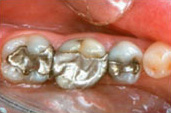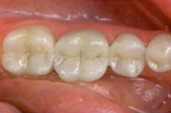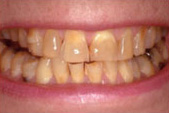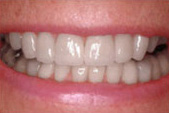Fillings | Root Canals | Tooth Extractions | Crowns
Our practice can provide a wide range of dental services. We can typically provide every type of dental service without having to refer you to other specialties. This flexibility saves you time and keeps your total dental care within one practice. Our emphasis is on total preventive care for our patients. Total care begins with regular hygiene visits, regular check-ups and continued home oral health routines.
Our practice also provides the highest-quality services for restoring mouths that have been damaged by dental disease and injury and common problems that require cosmetic dentistry. Our primary goal for our patients is to achieve and maintain optimum oral health through advances in techniques, technologies and by maintaining their scheduled dental exams.
Fillings
The concept of a “filling” is replacing and restoring your tooth structure that is damaged due to decay or fracture with a material. We will replace old, broken-down amalgam/metal fillings that contain traces of mercury with white fillings (composites) to restore your smile and teeth to a more natural look and feel.
With today’s advancements, no longer will you have to suffer the embarrassment of unsightly and unhealthy silver/mercury fillings or metal margins of the past. Eliminate the dark, black appearance in your teeth with new-age, state-of-the-art, tooth-colored resin or porcelain materials.
 Before
Before
 After
After
Root Canals
A root canal is a procedure that removes decayed pulp from the central part of the tooth, reshapes the canal and replaces it with strengthening filler.
A cavity is the result of superficial decay of the enamel of the tooth. Left long enough, this decay can burrow into the deeper reaches of the tooth, causing extensive damage to tooth structure. When the damage goes beyond what can be treated with a filling, dentists can perform a root canal (or endodontics), preserving the tooth and retaining its original integrity; thereby, saving a tooth that in the past would have to have been pulled.
Common causes for the need of endodontic treatment:
- Inflamed/infected tooth pulp
- Severe sensitivity to hot and cold elements
- Tooth decay
- Chipped or broken tooth
- Blow to the tooth
- Swelling or tenderness near the infected tooth
- Repeated dental procedures on a tooth
Please contact our office for an evaluation if you experience any of the symptoms above.
General Extractions
An extraction is the complete removal of a tooth. Extractions are sometimes necessary if a primary tooth is preventing the normal eruption of a permanent tooth, if the tooth has suffered extensive tooth decay or trauma that cannot be repaired, if the patient has gum disease, or if the tooth is impacted (usually the wisdom teeth). Depending on the complexity of the case, an extraction can be performed surgically or non-surgically. A mild anesthesia is used to ensure you are as comfortable as possible throughout the procedure.
Wisdom Teeth
Your third molars are more commonly called "wisdom teeth." Usually appearing in the late teens or early twenties, third molars often lack the proper space in the jaw to erupt fully or even at all. This common condition is called impaction. When any tooth lacks the space to come through or simply develops in the wrong place of your jaw and becomes impacted, problems can arise. Primarily, damage to adjacent teeth and crowding occur.
In certain cases, the wisdom tooth that cannot come through becomes inflamed under the gums and in the jawbone, causing a sac to develop around the root of the tooth that then fills with liquid. This can cause a cyst or an abscess if it becomes infected. If either of these situations goes untreated, serious damage to the underlying bone and surrounding teeth and tissues can result.
To potentially stave off this result, an extraction of one, several or all of the wisdom teeth may be advised. If that is the case, we have the equipment and training needed to perform such extractions, with an absolute minimum of discomfort. Ask our staff for more information regarding tooth extractions if you feel you may need one.
Crowns
A crown is a custom-made covering that fits over an original tooth that is either decayed, damaged or cracked. Crowns are made of a variety of different materials such as porcelain, gold, acrylic resin or a mix of these materials. Porcelain generally has the most natural appearance, although it is often less durable.
The treatment plan for a patient receiving a crown involves:
- Numbing the tooth to remove the decay in or around it.
- Re-sculpturing the tooth to provide an ideal fit for the crown.
- Making an impression of your teeth in order to create a custom-made crown (usually takes one to two weeks).
- Making a temporary crown out of acrylic resin and fitting it onto the tooth during the interim period when the permanent custom-made crown is being created.
- Applying the permanent crown (when received from the lab) by removing the temporary crown and fitting the permanent one onto the tooth.
- After ensuring that the crown has the proper look and fit, the dentist cements it into place.
This process generally consists of a minimum of two to three visits over a three to four week period. Once the procedure is completed, proper dental hygiene, including daily brushing and flossing, is required to maintain healthy, bacteria-free teeth, gums and crowns. This helps in the prevention of gum disease. Given proper care, your crowns can last a lifetime.
 Before
Before
 After
After